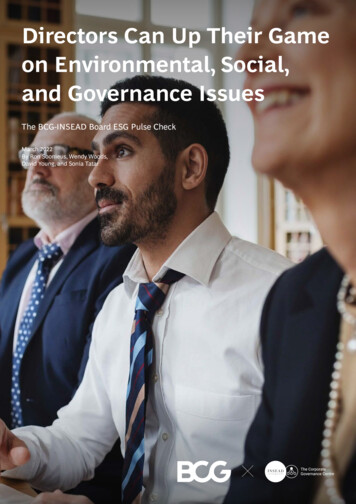
Transcription
Directors Can Up Their Gameon Environmental, Social,and Governance IssuesThe BCG-INSEAD Board ESG Pulse CheckMarch 2022By Ron Soonieus, Wendy Woods,David Young, and Sonia Tatar
Boston Consulting Group partners with leadersin business and society to tackle their mostimportant challenges and capture their greatestopportunities. BCG was the pioneer in businessstrategy when it was founded in 1963. Today,we work closely with clients to embrace atransformational approach aimed at benefiting allstakeholders—empowering organizations to grow,build sustainable competitive advantage, anddrive positive societal impact.Our diverse, global teams bring deep industry andfunctional expertise and a range of perspectivesthat question the status quo and spark change.BCG delivers solutions through leading-edgemanagement consulting, technology and design,and corporate and digital ventures. We work in auniquely collaborative model across the firm andthroughout all levels of the client organization,fueled by the goal of helping our clients thrive andenabling them to make the world a better place.The mission of INSEAD, The Business School forthe World, is to bring together people, cultures,and ideas to develop responsible leaders whotransform business and society.As one of the world’s leading and largest graduatebusiness schools, INSEAD offers participantsa truly global educational experience. Withlocations in Europe (France), Asia (Singapore),the Middle East (Abu Dhabi), and North America(San Francisco) and alliances with top institutions,INSEAD’s business education and research spansthe globe. The institution’s 165 renowned facultymembers from 41 countries inspire more than1,300 students in our degree and PhD programs.In addition, more than 11,000 executivesparticipate in INSEAD’s executive educationprograms each year.The INSEAD Corporate Governance Centre(ICGC) is engaged in making a distinctivecontribution to the knowledge and practice ofcorporate governance globally. Its vision is tobe the leading center for research, innovation,and impact in the field. Through its educationalportfolio and advocacy, the ICGC seeks to buildgreater trust within the public and stakeholdercommunities, so that businesses are a strongforce for improvement, not only of economicmarkets but also for the global societalenvironment.
Directors Can Up Their Game onEnvironmental, Social, andGovernance IssuesThe BCG-INSEAD Board ESG Pulse CheckIf there was any doubt that we’ve entered a new era for corporateboards, the 2021 proxy voting season dispelled it.Activist investors focused on accelerating Exxon Mobil’stransition toward clean energy secured three seats on theoil and gas company’s board. Meanwhile, Blackrock, theworld’s largest fund manager, voted against 255 directorsduring the 2020-2021 proxy year on the basis of climate-related concerns.Such events are a sign of things to come—and are rapidlypushing environmental, social, and governance (ESG)issues higher on board agendas.While corporate management is under constant pressureto deliver strong financial performance over the short andmedium term, board members have a different time horizon; though directors certainly do focus on short- andmedium-term performance, they play a critical role insteering companies over the long term. And the ESG challenges confronting companies today—including climate,income inequality, diversity, equity, and inclusion, andgeopolitical tensions, most recently the war in Ukraine—will require sustained, long-term action. Consequently, suchmatters sit squarely in the purview of the board. “A company should not be taken by surprise on [the importance of ]ESG,” said one director serving on the boards of multipleenergy companies. “Board members should be aware thatit is now what society expects of you.”There is no one-size-fits-all solution for boards, however,when it comes to understanding, overseeing, and engagingwith management on ESG issues. The topics that arematerial will vary by industry and are themselves dynamicby nature. And a board’s actions will also depend in parton the company’s maturity level with respect to ESGmanagement.BOSTON CONSULTING GROUPXINSEAD With that in mind, BCG and the INSEAD Corporate Governance Centre have teamed up on a multiyear initiative,including regular pulse check surveys and interviews, tostudy the role boards play in overseeing ESG. We will assess how boards are engaging with ESG matters today andto what extent existing board practices can deal with thesecomplex and systemic challenges. (See the sidebar, “TheBCG-INSEAD Board ESG Pulse Check.”) Additionally, ineach survey we will take an in-depth look at a critical ESGmatter facing boards; in this report we focus on climate.Our goal in this collaboration is to help identify the mosteffective ways boards can integrate ESG considerationsinto their oversight and governance. This inaugural surveyand interviews reveal a number of insights: Roughly 70% of directors reported that they are onlymoderately or not at all effective at integrating ESG intocompany strategy and governance. Although directors think their boards should devotemore time to strategic reflection when it comes to ESGissues, more than half (53%) said they are not effectiveat doing that. Boards clearly see addressing climate change as a toppriority; still, among companies with a net-zero commitment, only 55% of directors reported that their organization has prepared and published a plan for hitting thattarget. A full 43% of directors cited the ability of the companyto execute as one of the biggest threats to delivering onESG goals.1
The BCG-INSEAD Board ESG Pulse CheckBCG and INSEAD bring complementary experience to thetask of understanding the evolving role of boards. BCG hasextensive experience working with companies in manyindustries to develop sustainability strategies and sustainable business models, as well as experience working directly with boards to integrate ESG into board oversight andgovernance. And INSEAD has in-depth academic knowledge on the role of boards in sustainability and long-termvalue creation, including the INSEAD Corporate Governance Centre’s work leading academic studies and programs and the INSEAD Directors Network’s applied, practical research leveraging the global community.Through the multiyear BCG-INSEAD partnership, we willconduct a series of periodic surveys and interviews anddraw on insights from our ongoing work as practitionersand academics. For this inaugural report, we have interviewed more than 50 directors who have at least 10 years’2 experience as a board member and who serve on morethan 150 corporate boards combined. Our survey capturedinsights from 122 respondents who have an average of 7years of experience as a board member and who are affiliated with 2 boards on average. The majority (80%) of respondents are non-executive directors, with 33% of thoseindividuals serving as the board chair. Another 14% ofrespondents are CEOs and the remaining 6% supportthe board as corporate secretary and legal counsel. (Seeexhibit.)On the basis of this research and work, we aim to developpeer insights that help boards and board members become more effective at integrating ESG considerations intotheir oversight and governance.DIRECTORS CAN UP THEIR GAME ON ENVIRONMENTAL, SOCIAL, AND GOVERNANCE ISSUES
A Breakdown of Survey RespondentsIndustryIndustrial Goods9%Consumer Products13%Education1%Communication Services3%Energy8%Utilities2%Health Care11%Materials11%Real Estate2%Financial Institutions24%Information Technology7%Other9%Region66%North AmericaEurope15%16%3%South AmericaDesignationOrganization TypeAsia-PacificOrganization elyownedOther 1billion 1 - 10billion 10billionSource: BCG-INSEAD ESG Pulse Check Survey (2021).Note: the total number of respondents was 122.Revenues not provided by 7% of companies surveyed.1BOSTON CONSULTING GROUPXINSEAD 3
These findings highlight some critical gaps in board oversight of ESG. But they also reveal a major opportunity.Boards that rise to the ESG challenge can help the companies they oversee create sustainable competitive advantage while also driving progress on some of society’s mostsignificant challenges.“A company should not be taken by surprise on[the importance of] ESG,” said one director. “Boardmembers should be aware that it is now whatsociety expects of you.”The ESG Imperative for BoardsCorporations are at the center of some critical societal andenvironmental challenges—and are often leading the wayon solutions. This is reshaping board agendas and forcingdirectors to manage competing stakeholder interests. Asour survey results indicate, however, many boards are stillstruggling with how to provide effective governance of ESG.ESG Moves Higher on the Board Agenda. Powerfulforces, including escalating investor and social activism, amounting sense of urgency related to climate change, andincreasing action by regulators (particularly on environmental topics), are changing the context for businessglobally. In this environment, more and more ESG issuesare understood to create significant risks for companies aswell as opportunities for building competitive advantage.Regulation in particular is an increasingly critical factor forboards when it comes to ESG, with the pace of regulatoryactivity picking up significantly in recent years. (See thesidebar, “The Regulatory Push for Sustainability.”)Boards, however, have historically not placed a major focuson assessing and governing ESG matters. There are twoprimary reasons for this. First, directors in the past havebeen guided by the view that their foremost responsibilitywas to shareholders—specifically, maximizing shareholderreturns, with limited consideration given to the impact onsociety or the environment. Second, until relatively recently, performance in ESG was not widely accepted as contributing to financial performance.4 However, today the thinking on both factors—fiduciaryresponsibility and the materiality of ESG—has evolved: Fiduciary responsibility. Businesses today are findingthey are increasingly likely to be held responsible byshareholders and other stakeholders for the negativeexternalities they create in their operations, products,and services. Failure to address these issues will hinder acompany’s ability to create value over the long term. Given that reality, it is important to correct a common misunderstanding among many directors that the fiduciaryduty of the board is to put shareholders first—especiallyshort-term shareholders. In fact, corporate law in nearlyevery country in the world states that the fiduciary dutyof the board is to the corporation. In that context, boardmembers must be cognizant of sustainability issues thataffect the company’s ability to survive and thrive overthe long term. This requires engagement by the company with shareholders, employees, customers, suppliers,and the communities in which the company operates.Importantly, shareholders are increasingly demandingengagement with the board of directors itself. Materiality of ESG Issues. A sustainability issue is“material” if it is important to stakeholders and relatedto creating long-term value. Some issues, like climatechange, are material for virtually every industry in theworld. Most, though, are very industry specific; safetyin clinical trials, for instance, is material for a pharmaceutical company but not a bank. Analyses by BCG andothers have shown that there is a correlation betweencompany performance on material ESG issues and longterm financial performance. It’s no surprise, then, thatinvestors are increasingly integrating ESG into investment decisions.“Business changes as society changes,” noted one directorwho serves on the boards of multiple European financialinstitutions. “Formally the board role hasn’t changed, but[boards] have more weight, and they cannot afford to jumpinto easy solutions when it comes to considering societaland environmental considerations as part of the long-termsuccess of the company.”DIRECTORS CAN UP THEIR GAME ON ENVIRONMENTAL, SOCIAL, AND GOVERNANCE ISSUES
The Regulatory Push for SustainabilityRegulators around the world are increasingly using theirauthority to push for corporate attention and action onESG issues. In Europe, where workers often have regulation-mandated representation on corporate boards, theinterests of stakeholders such as employees have historically been factored into regulatory and corporate decisionsmore than in the US.Nevertheless, the EU keeps pushing the needle. The European Green Deal, for example, aims to make Europe thefirst climate-neural continent; disclosure requirementsregarding the social and environmental impacts of companies’ activities are also being expanded. In addition, the EUis developing a sustainable corporate governance initiativeto ensure that sustainability is further embedded into thecorporate governance. The initiative ultimately aims toBOSTON CONSULTING GROUPXINSEAD better align the long-term interests of business, society,and the environment, and to provide a framework forcorporate boards to integrate these interests properly intostrategies, decisions, and oversight.At the same time, US regulators are also signaling a shifton how they view corporate responsibility as it relates tomajor societal challenges. For example, the Securities andExchange Commission has issued new guidance regardingwhen companies can exclude a proposal from the company proxy statement. While the rule previously stated thatcompanies could exclude a shareholder proposal if it didnot raise social and ethical issues for the company—nowcompanies must demonstrate that the proposal does notraise issues with broad societal impact.5
A Delicate Balancing Act. As directors step up oversightand governance of ESG matters, they face demands from awide range of stakeholders. Investors are taking a moreactivist stance: roughly three-quarters of our survey respondents reported that their board’s dialogue with shareholders on ESG has intensified. And a similar share of respondents expects an increase in the number of shareholderproposals related to ESG issues. Some 64% of directorsexpect institutional investors to put forth new ESG-relatedproposals at their next annual general meeting; 33% expect pension funds to offer ESG proposals, and 30% ofdirectors expect NGOs to do so.Other stakeholders are becoming just as vocal. Whilethree-quarters of respondents in our survey reported thatshareholders are key drivers of company decisions relatedto ESG issues, a significant share also cited governmentsand regulators (62%), customers (55%), and employees(55%) as important players. Noted the director serving onthe boards of multiple energy companies, “[boards] reallyneed to engage with these [stakeholder] groups, showingthat you take their point seriously and [demonstrating]commitment through monitoring and concrete plans.”There is no one-size-fits-all solution for boardswhen it comes to understanding, overseeing, andengaging with management on ESG.In some cases, various stakeholder groups may have differing priorities. Ultimately, it is the board’s fiduciary role toput a governing mechanism in place that ensures thebalancing of those competing interests. In that role, boardsmust challenge management on the rigor they havebrought to determining which ESG issues are material. Andthey must bring similar robust oversight to how management is prioritizing responses to those material issues—and how management is linking its actions to the creationof business value. (It’s worth noting that the view of whichissues are in fact material can differ by region. Boards inEurope, for example, are more likely than boards in NorthAmerica to factor in the interests of stakeholders otherthan investors—even if those interests tend to not bematerial in the strictest financial sense.)For boards that lag in addressing ESG concerns, the risksfor directors go beyond possible removal by activist shareholders. In many jurisdictions, board members can besued based on what they did or did not do in relation toclimate change, according to report by the CommonwealthClimate and Law Initiative; the potential legal liabilitystems from the fact that climate change poses a significantrisk for businesses and therefore the board has a duty toaddress it effectively. This includes directors in the US,where the prevailing view has been that the interests ofshareholders alone should take precedence. The first suchlitigation was recently filed—the nonprofit ClientEarth hasinitiated legal action against Shell’s board of directors,contending they have failed to properly manage the company’s climate risk.6 Charting a Path ForwardAs ESG issues become more central to the board agenda,it’s critical to understand where directors see barriers toeffective oversight and what practices they are putting inplace to govern ESG.Board ReadinessA key element of any board’s role is to ensure the company delivers on its purpose and value statements. Andabout three-quarters of our survey respondents reportedthat ESG considerations are an integral part of such statements. However, a full 71% of directors said they are onlymoderately or not at all effective at governing ESG issues.What accounts for that underperformance? We askeddirectors what roadblocks their boards faced when it cameto addressing ESG-related matters. The top response: theboard’s lack of knowledge, data, and capabilities, a barriercited by 44% of respondents. (See Exhibit 1.)Assessing ESG factors to understand and identify thosethat are material today—or that are likely to become so inthe future—and balancing stakeholder interests in a waythat best guarantees the long-term success of the companyisn’t easy. It requires expertise that goes beyond the skillsand competencies that have traditionally been deemedvaluable for board membership.Unfortunately, less than half of the directors surveyed—47%—believe their board has sufficient ESG competence and experience to challenge management on ESGplans and exercise board oversight on execution. That islikely due to the speed at which ESG has gained importance; boards, meanwhile, have not been aggressive aboutbolstering their ESG credentials. According to recent research by INSEAD and Heidrick and Struggles, 69% ofrespondents said ESG is not integrated into their board’scompetency matrix.Directors also have concerns about how companies themselves are positioned to deliver improved ESG performance. The top barrier cited was the overall ability of theorganization to execute (43%) followed by the potential forcost increases (35%). Organizational culture and management’s commitment to addressing ESG concerns were alsoseen as major barriers by roughly 30% of those surveyed.(See Exhibit 2.)Even so, boards appear to be moving slowly to use leverssuch as compensation to incentivize a greater ESG focus:only half of those surveyed reported that ESG has beenintegrated into performance-driven compensation measures for management.DIRECTORS CAN UP THEIR GAME ON ENVIRONMENTAL, SOCIAL, AND GOVERNANCE ISSUES
Exhibit 1 - The Roadblocks to Effective Board Oversight of ESGShare of directors who cited the following (%)44Lack of knowledge, data, or capabilities43Complexity and ambiguity management30Lack of board commitment26Inability to translate ideas into action25Failure to prioritize ESG19Wrong long-term strategic choices11Poor control of execution11Inertia or paralysis in decision making7OtherLack of attention to detail5I don’t know5Source: BCG-INSEAD ESG Pulse Check Survey (2021).Exhibit 2 - Why Companies Aren’t Fully Delivering on ESGShare of directors who cited the following threats to achieving their companies' ESG goals (%)43Ability of the organization to execute35Costs increase32Organizational culture30Management’s commitment25Board’s commitment21Constraints from legacy assets19Constraints of energy options11I don’t see threatsSupply limitations5Other5I don’t know1Source: BCG-INSEAD ESG Pulse Check Survey (2021).BOSTON CONSULTING GROUPXINSEAD 7
Board PracticesTo overcome these barriers, boards must reevaluate theirapproach to ESG governance, expand their access toknowledge and expertise on critical ESG matters, andrethink their agendas in order to devote more time tobroad strategic reflection.Board Approach to ESG Governance. Boards mustmake critical decisions about how to structure the ESGwork and oversight they do. A recently released study bythe INSEAD Corporate Governance Centre describes sixcore models for integrating ESG into board governance.The BCG-INSEAD survey revealed the extent to whichcompanies are deploying these models. (See Exhibit 3.)The most common approach (31%) for anchoring ESG intoboard governance is assigning oversight of these issues tothe full board. In such cases, ESG issues can be discussedor worked on within committees, but the decisions relatedto these matters are made by the full board. Although thisapproach is prevalent, the risk is that ESG issues do notget sufficient time and attention given all the demands onthe full board. The second most common structure (20%)is to have the issues governed by a dedicated ESG committee of the board, while the third most common approach(15%) is to have one member of the board—with no separate committee—lead on ESG issues.Looking at North America and Europe—the two regionswith the largest numbers of respondents—there are somenotable differences. In North America, ESG governance isthree times more likely to be handled by an existing committee of the board than in Europe; meanwhile, in Europethese issues are two times more likely to be governed by adedicated board member than in the US.Ultimately, BCG’s work with clients and INSEAD’s researchshow that there is no single “best practice” for dealing withESG issues. Companies are finding success—or challenges—with all models. The right structure will depend onfactors such as the composition and ESG knowledge baseof the board, its existing governance practices, the maturityof both the company and the board when it comes toaddressing ESG topics, the experience and capabilities ofthe company’s sustainability staff and resources, and thecompany’s culture and history in integrating ESG into itsbusiness.Board Knowledge. As noted above, directors see a lack ofboard ESG knowledge and competency as a meaningfulchallenge. Adding ESG education as part of regular boardtrainings can help establish a solid baseline of understanding among directors. However, boards should push forgreater competency, systematically assessing what expertise they need in order to be effective at oversight of ESGissues. “Traditional knowledge and experience remainimportant,” asserted one director who serves on theboards of multiple property and construction companies.“But one-third of the board should have knowledge andexperience in how the role of business in society is changing and what that means for corporate strategy. This isessential to get sustainability embedded into board dynamics.” While some boards may not follow this one-thirdrule to the letter, we do believe it is a useful guide whenconsidering board composition.Of course, the list of potential ESG topics is long and themateriality of such issues can change over time, making itimpossible for boards to have experts on every relevanttopic among their current directors. Consequently, boardsmust determine whether they need an expert on a specificESG topic to be on the board—or should instead solve theknowledge gap by leveraging other experts.Exhibit 3 - Models for Anchoring ESG in Board Governance Vary% of directors who said ESG is 31The full board’s responsibility20Part of a dedicated ESG committee15Managed by a dedicated person but there is no separate committee12Not overseen by boardPart of the board committee overseeing another issue10Distributed between appropriate board committees10Other2Source: BCG-INSEAD ESG Pulse Check Survey (2021).8 DIRECTORS CAN UP THEIR GAME ON ENVIRONMENTAL, SOCIAL, AND GOVERNANCE ISSUES
The ESG challenges confrontingcompanies today will requiresustained, long-term action.
There are advantages to ensuring one director (or even afew) has expertise on the most material ESG issues for thecompany. A knowledgeable director can influence theboard’s discussions and decisions to a greater degree thanif they were an outsider. And having such expertise on theboard shows the organization as well as external stakeholders that the company takes these topics seriously.The number of potential ESG topics is long and themateriality of such issues can change over time,making it impossible for boards to have experts onevery relevant topic among their current directors.Bringing in outside experts—whether on a regular or flexible basis—allows boards to focus only on finding advisorswith deep subject-matter expertise on specific ESG topicsrather than searching for someone who has both theknowledge of those specific topics and the broad experience that makes them suitable to serve as a director. Oursurvey found that the most common approaches to supplementing board knowledge are regular updates from aninternal executive with responsibility for ESG (48%) andintermittent updates from external experts (40%). Morepermanent arrangements with outside advisors, such asimplementing an independent advisory council with ESGexperts, are much less common.When it comes to drawing on external experts, differentapproaches will have unique advantages. One-off arrangements involving intermittent updates from external experts allow boards to access very specific expertise in atimely fashion—a critical advantage when materiality is influx. The advantage of a more permanent arrangementwith external advisors to the board is that they get to theknow the company—and its challenges—on a deeperlevel, leading to richer discussions and arguably betterdecision making. Depending on the board’s specific needs,the best approach may involve a combination of thesemeasures and may change over time.10 Board Agendas. The knowledge base of the board andthe structure it creates to anchor ESG has direct bearingon a critical issue: giving directors the time for true strategic thinking. Our survey revealed that 91% of directorsbelieve that when it comes to aligning the company’slong-term business strategy with ESG challenges, the boardshould focus more on improving strategic reflection thanon monitoring operations. However, less than half of that91% believe they are effective at driving that strategicreflection. One director of a large global apparel companynoted that, while the material provided to the board onwhich he serves is comprehensive, “there is rarely anydiscussion. It feels like a formality for the board, eventhough management does take the topic seriously.”The ESG issues that boards are prioritizing—and notprioritizing—today underscore the need for true strategicreflection. (See Exhibit 4.)Few would dispute the importance of reducing carbonemissions. What is surprising, however, is the absence ofsome critical issues. Consider biodiversity, for example. TheWorld Economic Forum’s Global Risk Report, based on asurvey of business, government, and civil society leaders,has identified biodiversity loss as one of the top five globalrisks in terms of both likelihood and impact. However, theissue does not appear to be registering among the universe of directors we surveyed. In general, such “multicriteria” ESG topics—those with multiple and interconnecteddrivers and significant measurement challenges—are nothigh on the agendas of many boards today.So how do boards ensure they have insight on the forces—including those related to ESG—that will be shaping theworld in the years and decades ahead? Scenario planningcan be a powerful tool in gaining that requisite foresight,enabling the board to identify complex, long-term risks.“The primary task of the board is to look over the horizon,”says the financial institutions director. “You need to understand where the world [is moving].” In addition to climate,robust scenario-planning exercises may include uncertainties related to geopolitical dynamics, technology development, inequality, and societal cohesion. However, roughlyhalf of the directors surveyed reported their companies arenot yet conducting such exercises.DIRECTORS CAN UP THEIR GAME ON ENVIRONMENTAL, SOCIAL, AND GOVERNANCE ISSUES
Exhibit 4 - Carbon Emissions Are the Top ESG ConcernTop three ESG issues cited, by industry123ConsumerCarbon emissionsEnvironment as acompetitive advantageHealth and safetyIndustrial GoodsCarbon emissionsPollution and wasteHealth and safetyClimate change vulnerabilityEnergyCarbon emissionsPublic policy and regulationEnvironment as acompetitive advantageTechnology, Media, andTelecommunicationsCybersecurityCarbon emissionsBusiness ethicsFinancial InstitutionsCybersecurityClimate change vulnerabilityFinancing environmentalimpactMaterialsEnvironment as acompetitive advantageCarbon emissionsCybersecurityHealth CareEmployee engagementCybersecurityHealth and safetyUtilitiesCarbon emissionsCybersecurityBoard diversityESGSource: BCG-INSEAD ESG Pulse Check Survey (2021).BOSTON CONSULTING GROUPXINSEAD 11
The Climate Change ChallengeCompanies are increasingly taking the lead on emissionsreduction—and last year’s United Nations Climate ChangeConference (COP26) cast a light on that mounting sense ofurgency. An unprecedented number of companies madenet-zero commitments in the lead up to COP26, bringingthe total to more than 5,200 at last count. Many of thesecompanies are setting targets, developing clear pathwaysto reach those targets, and building the required coalitions.There are a growing number of private-public collaborations, including global initiatives to develop, scale, anddeploy the tec
nance Centre's work leading academic studies and pro-grams and the INSEAD Directors Network's applied, practi-cal research leveraging the global community. Through the multiyear BCG-INSEAD partnership, we will conduct a series of periodic surveys and interviews and draw on insights from our ongoing work as practitioners and academics.











